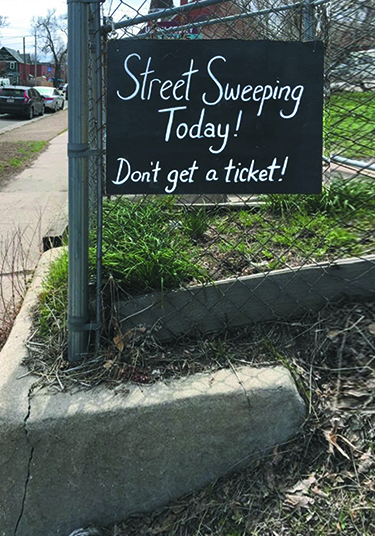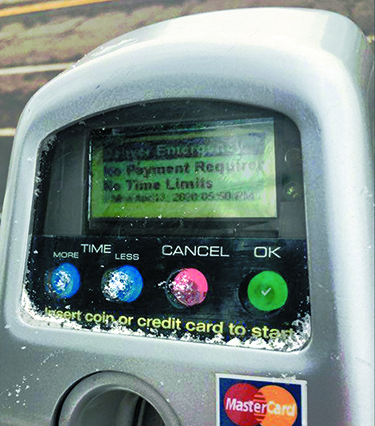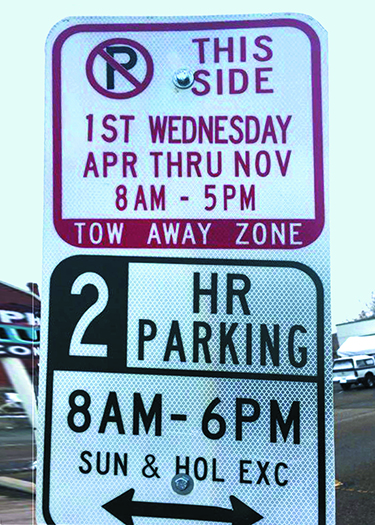“All human beings are my neighbors. We share the same planet.”
— Ana Monnar

by Luke Schmaltz
By mid-March of this year, a new reality had descended upon Denver, as the COVID-19 lockdown forced residents to curtail social behavior, forgo daily objectives and divert vocational routines in never-before-seen ways. As thousands of “non-essential” workers were forced from their jobs and directed by government officials to stay at home, the Denver Department of Public Works continued to operate as usual. The ever-elusive “ticket ninjas” crept along their daily routes, issuing citations for meter violations, time-limit abuses and parking in prohibited areas on street sweeping day offenses.
Neighborly Gestures
After grapevine investigation, it was discovered that some of these anti-citation signs were the work of a local artist known as Rez, who explains, “ I decided to make the signs because I know personally that the street sweeping catches me off guard, especially in the spring. I figured I was not the only one, and if I could help out a few neighbors and essential hospital personnel, it was worth making a couple of signs.” Although obstructing street sweeping is a fine-able offense, the actual presence of these machines is an urban mystery. Rez continues, “I think I saw a street sweeper that last day [last year] it was supposed to clean our street.”
With extra time on their hands, some residents of the Baker district decided not to take the untimely, insensitive issuance of parking tickets sitting down. In a bold, First Amendment-inspired move, locals began taking matters into their own hands and warning neighbors, locally employed professionals and other passers-through to be mindful of the cruel, merciless scourge of Denver meter maids. By the time street sweeping day came around in the first week of April, several sidewalks featured homemade signs warning that the citation hammer was afoot and set to drop on anyone and everyone parked on the wrong side of the street.

The Pen Is Mighty
Small Infraction, Massive Price
The consequences for non-payment of a parking ticket can be severe. Essentially, the issuance of a ticket initiates a process that, if not complied with, can result in the city commandeering (impounding) your vehicle with no obligation to return it. Rather, it could be held for months accruing ever-increasing fees and fines, and finally sold at auction for a fraction of its value so that the paltry revenue can be absorbed into a corpulent government bureaucracy.
Rapid Escalation
The average parking ticket in Denver cites the vehicle owner anywhere from $25 to $50. If not paid within 20 days, the fine doubles — making the vehicle eligible to be fitted with a wheel clamp and/or towed away. After 60 days, a collection fee is added and credit bureaus are notified, and after 120 days a default judgment is entered against whomever the vehicle is registered to — stating that all fines and fees must be paid by legal mandate. Finally, after one year, the file is turned over to a law firm which then pursues

aggressive private collection. An article published by The Denver Post in September 2019 reported that annual parking fee revenues for the previous year were in excess of $27 million. Believe it or not, that was the lowest figures reported in almost a decade. With that sort of money sitting in the city’s coffers, all streets should be free of potholes, every stoplight should sparkle, and shine and every street sign should be polished to a squeaky-clean sheen.
Shame Of The City
While Denver is known for many great things such as the Broncos and a certain omelet of the same name, it is also known for the infamous Denver boot. The aforementioned “wheel clamp” is deployed to disable any vehicle linked to unpaid parking violations. This blatant violation of Fourth Amendment rights (unreasonable searches and seizures) has spread to municipalities across the nations, giving the Mile-High City an unfair name among unfortunate motorists nationwide. Parking fines and additional fees notwithstanding, having a boot on a car entitles the owner to pay yet another fee to have it removed.
Supply And Demand
While parking enforcement has its place in keeping bike lanes and jogging paths obstruction-free, the aggressive policy of writing tickets, doubling fines and confiscating private property seems altogether overkill — especially in the midst of a pandemic — thus the vigilant residential blowback. As mentioned above, the issuance of tickets across Denver has leveled out over the last couple of years. The reason being for this? The economy was so good that the Department of Public Works couldn’t find enough people to fill all the parking agent positions — shedding light on what must be a truly lousy job.

A Temporary Standstill
Now that one-third of the labor force has been couched, the city probably won’t have trouble filling those empty ticket agent positions. Yet, for every hypervigilant meter maid scuttling about ruining people’s afternoons, there will be several dozen unemployed residents like Rez with enough time on their hands to post homemade signs warning others about being ticketed. Thankfully, by mid-April in this strangest of years, the issuance of parking tickets seemed to have dwindled even further. Perhaps city officials finally gave in to their human instincts to have a bit of mercy for their fellow citizens in the midst of a crisis.
One thing is for sure, though — as soon as things level out and the pandemic subsides — the ticket patrol will be back in full force … but so will Rez.
